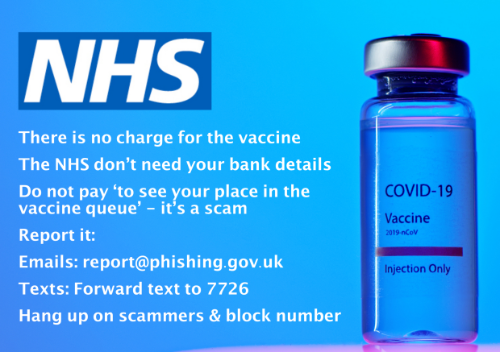Dyfed Powys Police Economic Crime Team has become aware that criminals have been sending texts and emails attempting to lure people to apply for the COVID-19 vaccine.
DC Gareth Jordan, from the Cyber Crime Unit, said: “The text is made to look like it comes from the NHS and states ‘we have identified that you are eligible to apply for your vaccine’ and advises you to follow a link to get more information and ‘apply’.”
“If you follow the link, you are taken to a convincing looking, but fake NHS website that asks for your personal details.
“After entering your details, it then requests bank/card details to ‘check your identity’.”
“But as with all scams, if you look a little closer, you will see it is not real. In this instance, note the URL is not www.nhs.uk/
“As multiple vaccines are now being approved for use in the UK, these types of fraud attempts will continue as criminals look to take advantage of the vaccine roll out.
“It’s not only texts, beware of cold calls and emails regarding the vaccine as scammers are also asking people to pay for it over the phone. Remember – the vaccine is free of charge and there is no way to jump the queue by paying for a ‘priority slot’.
“If you receive one of these calls, hang up and block the number.
“If you have received an email, which you are not quite sure about, forward it to the Suspicious Email Reporting Service (SERS) at report@phishing.gov.uk
“Suspicious text messages should be forwarded to 7726. This free-of-charge short code enables your provider to investigate the origin of the text and take action, if found to be malicious.”
Always:
Stop: Take a moment to think before parting with your money or information – it could keep you safe.
Challenge: Could it be fake? It’s ok to reject, refuse or ignore any requests. Only criminals will try to rush or panic you.
Protect: Contact your bank immediately if you think you’ve fallen victim to a scam and report it to the police.
Remember: The NHS, the police, or your bank, will never ask you to withdraw money or transfer it to a different account. They will also never ask you to reveal your full banking password or PIN.
Do not click on links or attachments in unexpected or suspicious texts or emails.
Confirm requests are genuine by using a known number or email address to contact organisations directly.
Always check the URL of a website.
The NHS don’t need your bank details and won’t ask for them in an email or text.
Help keep news FREE for our readers
Supporting your local community newspaper/online news outlet is crucial now more than ever. If you believe in independent journalism, then consider making a valuable contribution by making a one-time or monthly donation. We operate in rural areas where providing unbiased news can be challenging. Read More About Supporting The West Wales Chronicle

























